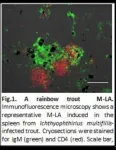(Press-News.org) Texas Children’s Hospital, an internationally-recognized, top-ranked children’s hospital and pediatric research center affiliated with Baylor College of Medicine, is the first to deliver a novel gene therapy to treat Rett syndrome in pediatric patients. Two female patients with Rett syndrome were the first children worldwide to receive this promising treatment.
This exciting milestone is part of an ongoing first-in-human Phase I/II trial of a new investigational gene therapy, NGN-401, conducted by Neurogene Inc., a clinical-stage company founded to bring life-changing genetic medicines to patients and families affected by rare neurological diseases. Texas Children’s is currently the first clinical trial site to recruit and dose patients in the U.S. for this multicenter study.
Rett syndrome is a rare neurodevelopmental disorder that primarily affects girls, most of whom develop normally until 6-18 months of age when they begin to experience progressive regression in acquired motor and verbal skills and develop constant hand-wringing behavior. Eventually, this condition causes severe impairments that affect nearly every aspect of their daily lives, including their ability to speak, walk, eat, and breathe.
In 1999, a team led by Dr. Huda Zoghbi, a distinguished service professor at Baylor College of Medicine, founding director of the Jan and Dan Duncan Neurological Research Institute (Duncan NRI) at Texas Children’s Hospital and Howard Hughes Medical Institute investigator, made the transformational discovery that mutations in methyl cytosine binding protein 2 (MECP2) gene causes Rett syndrome.
It is, therefore, particularly momentous that 25 years following that discovery, the first gene therapy trial for Rett syndrome is now underway in the same site under the guidance of Dr. Bernhard Suter, associate professor of Pediatrics and Neurology at Baylor College of Medicine and medical director of the Blue Bird Circle Rett Center at Texas Children’s.
Subsequent preclinical studies by Dr. Zoghbi’s team revealed that too much MeCP2 protein also results in progressive neurological dysfunction in mice, and studies by KU Leuven’s Dr. Hilde Van Esch and team, led to the identification of MECP2 duplication syndrome in humans. Since too little MECP2 causes Rett syndrome and too much of it can cause MECP2 duplication syndrome, it is critical that any therapeutic strategy that targets MECP2 must provide just the right amount of MECP2 protein to improve clinical outcomes and avoid toxicity.
Presently, only one specific treatment exists for Rett syndrome, and that drug does not correct the root cause of the disease, which is the loss or alteration of MECP2. There is, therefore, a significant unmet need to develop better treatments for this devastating condition.
“While gene therapy has proven to be a powerful tool in the treatment arsenal for a number of devastating genetic conditions, the highly variable transgene expression associated with conventional gene therapies has limited its application in many complex neurological disorders, especially Rett syndrome in which MECP2 transgene overexpression is toxic,” said Bernhard Suter, M.D., principal investigator of this Phase I/II clinical trial.
To address these issues, NGN-401 was purposefully designed to maximize the therapeutic activity while averting toxicities due to transgene overexpression. It is administered as a one-time treatment via the intracerebroventricular (ICV) route, which has been shown to maximize the delivery of the therapeutic MECP2 gene to key areas of the brain implicated in Rett syndrome. Dr. Daniel Curry, M.D., director, Functional Neurosurgery and Epilepsy Surgery at Texas Children’s Hospital and professor, Neurosurgery and Surgery at Baylor College of Medicine, performed the procedure to administer the gene therapy.
“This gene therapy trial is an exciting step forward in finding an effective treatment for this difficult-to-treat genetic condition,” Dr. Zoghbi said.
Based on the first two treatment recipients, NGN-401 has no serious side effects to date. “We are encouraged by the tolerability profile observed in our first two pediatric patients, and look forward to collecting sufficient follow-up data on a larger number of patients to inform the therapeutic potential of NGN-401, which we believe could serve as a best-in-class therapy,” Rachel McMinn, Ph.D., founder and chief executive officer of Neurogene, said.
The doctors in the Blue Bird Rett Center are hopeful that this treatment will fundamentally change the therapeutic landscape for these patients. “All of us at Texas Children’s Hospital and Baylor College of Medicine are very grateful to all Rett patients and their families whose resilience, courage, and support drive our research efforts and inspire us,” Dr. Zoghbi added.
For more information, see Neurogene’s news release
About Texas Children’s
Texas Children’s, a nonprofit health care organization, is committed to creating a healthier future for children and women throughout the global community by leading in patient care, education and research. Consistently ranked as the best children’s hospital in Texas, and among the top in the nation, Texas Children’s has garnered widespread recognition for its expertise and breakthroughs in pediatric and women’s health. The system includes the Texas Children’s Duncan NRI; the Feigin Tower for pediatric research; Texas Children’s Pavilion for Women, a comprehensive obstetrics/gynecology facility focusing on high-risk births; Texas Children’s Hospital West Campus, a community hospital in suburban West Houston; and Texas Children’s Hospital The Woodlands, the first hospital devoted to children’s care for communities north of Houston. The organization also created Texas Children’s Health Plan, the nation’s first HMO for children; Texas Children’s Pediatrics, the largest pediatric primary care network in the country; Texas Children’s Urgent Care clinics that specialize in after-hours care tailored specifically for children; and a global health program that’s channeling care to children and women all over the world. Texas Children’s Hospital is affiliated with Baylor College of Medicine. For more information, go to www.texaschildrens.org.
END
Rett patients receive a new gene therapy treatment at Texas Children’s Hospital and Baylor College of Medicine
2023-12-01
ELSE PRESS RELEASES FROM THIS DATE:
A color-based sensor to emulate skin's sensitivity
2023-12-01
Robotics researchers have already made great strides in developing sensors that can perceive changes in position, pressure, and temperature – all of which are important for technologies like wearable devices and human-robot interfaces. But a hallmark of human perception is the ability to sense multiple stimuli at once, and this is something that robotics has struggled to achieve.
Now, Jamie Paik and colleagues in the Reconfigurable Robotics Lab (RRL) in EPFL’s School of Engineering have developed a sensor that can perceive combinations of bending, stretching, compression, and temperature changes, all using a robust system that boils down ...
SFU researchers sound out Canadian military’s plan to combat ocean noise pollution
2023-12-01
new study from Simon Fraser University researchers examines the Canadian military’s efforts to reduce the impacts of underwater noise pollution on species during training exercises in the Pacific Ocean but caveat that more can still be done.
The paper, published today in Marine Policy, takes aim at a report commissioned by the Canadian Department of National Defence (DND) to reduce the effects of noise pollution from military small-arms munitions training within “Whiskey Hotel”, a 330-square-kilometre ...
Coverage of Bruce Willis’ frontotemporal degeneration shows media misconstrues the disease
2023-12-01
A new paper in Innovation in Aging, published by Oxford University Press, shows that a great deal of media coverage of the actor Bruce Willis’ condition, frontotemporal degeneration, was inaccurate, revealing the public’s limited knowledge of the disease.
In 2022, Willis’ family released a statement saying that he had been diagnosed with aphasia, an acquired language impairment, and would retire from acting. Ten months later, the family issued another statement indicating doctors had diagnosed Willis with a more specific condition, frontotemporal degeneration. ...
Potential pitfalls when using the Cre-LoxP system in cancer research
2023-12-01
“One limitation [of Cre-LoxP], the focus of this editorial, is the potential loss of fidelity of Cre recombinase expression especially in the context of modeling cancer in mice.”
BUFFALO, NY- December 1, 2023 – A new editorial paper was published in Oncoscience (Volume 10) on November 14, 2023, entitled, “Be mindful of potential pitfalls when using the Cre-LoxP system in cancer research.”
In this new editorial, researchers Piotr Czarnota and Jaroslaw Cisowski from Jagiellonian University discuss Cre-LoxP — a widely used system to conditionally modify gene expression in mouse models of cancer and other diseases.
“It ...
CHOP researchers discover deep structural biology connections that help improve CAR therapy
2023-12-01
Philadelphia, December 1, 2023 – Chimeric Antigen Receptors (CARs) have opened up an exciting new field of therapeutic advancements for rare and difficult-to-treat cancers, as they have the ability to deliver targeted therapies that can kill tumor cells. Peptide-centric CARs (PC-CARs) rely on specific peptide “barcodes,” which are derived from proteins within the cell created by potentially cancer-causing oncogenes, are designed to find and target cancer cells. These “barcodes” are displayed by human leukocyte antigens (HLAs), which help the immune system distinguish its own proteins from foreign invaders, ...
Can preeclampsia be prevented?
2023-12-01
NEWS RELEASE
EMBARGOED UNTIL FRI, DEC. 1 -- 2:00 P.M. EASTERN
Contact
Colleen McDonald - Sr. Consultant, Earned Media
414.801.3146 | cmcdonald@mcw.edu
Milwaukee, Wis. – Dec. 1, 2023 – Preeclampsia is a mysterious condition that occurs in about one of 10 pregnancies without any early warning signs. After 20 weeks or more of normal blood pressure during the pregnancy, patients with preeclampsia will begin to experience elevated blood pressure and may also have increased levels of protein in their urine due to hypertension reducing the filtering power of the kidneys. Prolonged hypertension due ...
Meditation training can support wellbeing in older adults
2023-12-01
Following an 18-month meditation programme can improve the wellbeing of older adults, finds a new randomised controlled trial by an international team co-led by UCL.
The findings, published in PLOS ONE, show that meditation can improve people’s awareness, connection to others, and insight.
While the meditation training did not confer significant benefits on two commonly used measures of psychological wellbeing and quality of life, the researchers say their findings may reveal limitations in existing methods of tracking wellbeing.
Lead author Marco Schlosser (UCL Psychiatry and University of Geneva) said: “As the global population ...
Research shows human behavior guided by fast changes in dopamine levels
2023-12-01
What happens in the human brain when we learn from positive and negative experiences? To help answer that question and better understand decision-making and human behavior, scientists are studying dopamine.
Dopamine is a neurotransmitter produced in the brain that serves as a chemical messenger, facilitating communication between nerve cells in the brain and the body. It is involved in functions such as movement, cognition and learning. While dopamine is most known for its association with positive emotions, scientists are also exploring ...
Scientists navigate uncharted waters in fish immunology research
2023-12-01
Upon infection or immunization, all jawed vertebrate species generate proteins called antibodies that bind and neutralize pathogens. Strong and long-lasting antibody responses in warm-blooded species such as mammals are produced in secondary lymphoid microstructures (SLMs) among which germinal centers (GCs) are the centerpiece. Despite the apparent absence of GCs or similar SLMs in cold-blooded vertebrates (e.g., fish), these species can mount significant antibody responses that can persist for several months. Thus, for decades, the outstanding question has remained as to how and where ...
Study explores how pre- and postnatal B-12 vitamins improve breast milk vitamin B-12 levels, which supports infant brain development
2023-12-01
Babies and children need vitamins, including vitamin B-12, to help their brains and bodies develop and grow. Babies get B-12 from their mothers and can have low levels of B-12 if their mothers had low vitamin levels during pregnancy and breastfeeding. The vitamin B-12 levels of infants strongly depend on maternal levels. Adequacy of vitamin B-12 in breast milk is particularly important for infants during the first six months of life when breastfeeding is highly recommended. Even after the first six months of life, breast milk may continue ...




